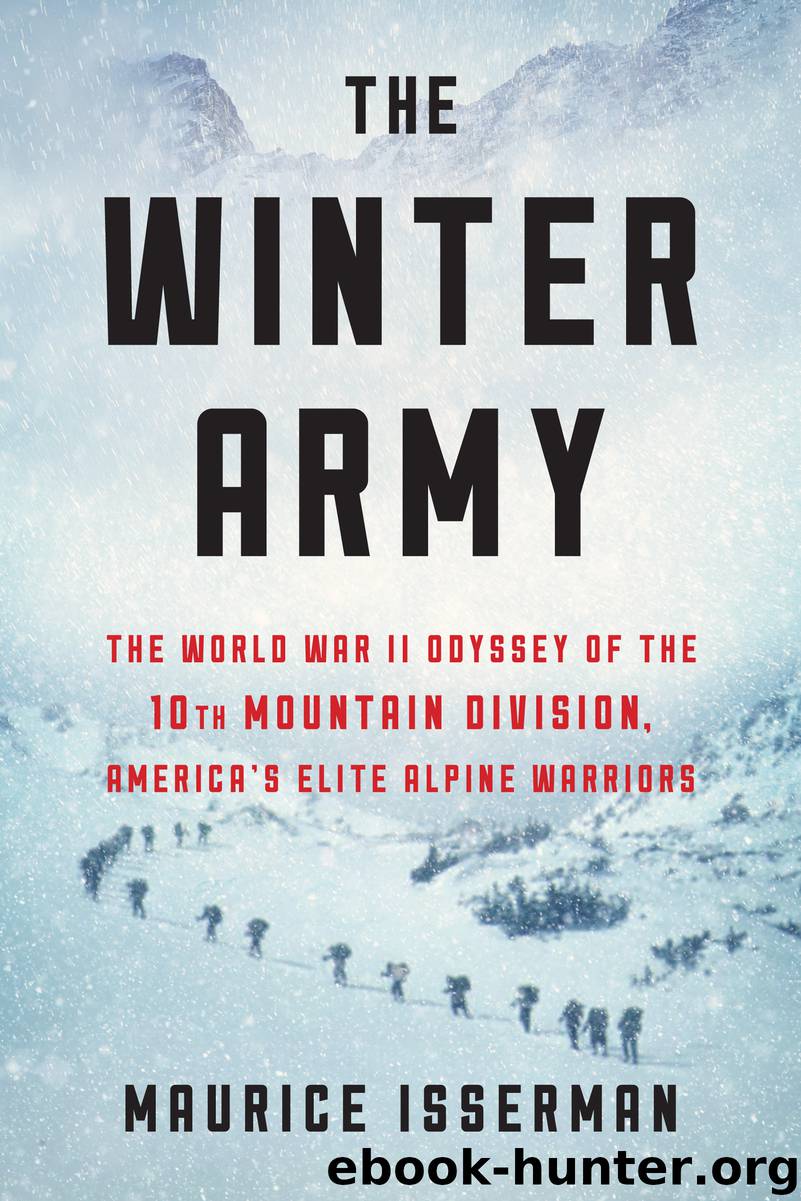The Winter Army by Maurice Isserman

Author:Maurice Isserman
Language: eng
Format: epub
Publisher: HMH Books
They drove ahead, remembering General Hays’s injunction, “always forward,” while leaving a trail of dead and wounded comrades.
Much the same thing happened around the base of Mount Belvedere in the early morning hours of February 20. Private Robert Krear, L Company of the 86th, carried a twenty-one-pound Browning automatic rifle, along with an additional twenty pounds of ammunition, up the lower slopes of Gorgolesco on the first night’s assault. He was accompanied by Private Gene Sisler, a former Idaho cowboy who joined the 10th as a replacement in Italy and who carried additional ammunition for the Browning along with his own rifle. Both lived through the night, but many of those with whom they set off hours before didn’t. Krear’s platoon came under fire from German machine guns and mortars as it crossed open pastures on a farm below Gorgolesco. The men toiled through the deep snow in the pasture, which slowed their advance and made them even more vulnerable to the machine gun fire. But the snow proved advantageous in one respect. As Krear recalled, “The mortar shells would not explode until they had penetrated all the way to the ground level,” which meant that most of the shrapnel and concussion was absorbed by the snow cover. “If it had not been for the snow, many more of us might have been casualties.”
One of those in L Company who did not survive the day’s fighting was Private Stuart E. Abbott, the aspiring naturalist from Chicago who had turned twenty at the start of February. Shortly after his birthday he had assured his family that “life in the front lines isn’t as bad as I expected.” In his last letter home, dated February 15, he warned, “Again you must except [sic] lapses in my mail,” while apologizing for the brevity of the note. Abbott’s squad leader, Staff Sergeant Paul Anderson, wrote to Abbott’s mother several months later to report the circumstances of her son’s death. As was true of most such messages, he didn’t dwell on upsetting details. Abbott, he wrote, “met his death as easily as any soldier could. There was a sniper on our left flank which was unknown to us at the time until one shot rang out and Stuart fell. I can say truthfully that to my knowledge he did not suffer at all. When we could get to him he was gone.” Anderson himself was wounded a short time afterwards and spent the remainder of the war hospitalized.
One after another, the dark silent columns of mountain troopers making their way around and up Belvedere and Gorgolesco crashed into German fire. In addition to grenades, machine guns, mortars, and artillery, there were, for the first time in the experience of the 10th, enemy rockets (known as the “moaning minnies,” or “screaming meemies,” for the unnerving sound they made as they descended). And, even more terrifying, exploding mines. The mines usually either killed their victims outright or left feet, legs, intestines, and genitalia mutilated. Sometime that night,
Download
This site does not store any files on its server. We only index and link to content provided by other sites. Please contact the content providers to delete copyright contents if any and email us, we'll remove relevant links or contents immediately.
| Excursion Guides | Mountain Climbing |
| Rock Climbing |
Annapurna by Maurice Herzog(3467)
Into Thin Air by Jon Krakauer(3399)
SAS Survival Handbook by John 'Lofty' Wiseman(2723)
The Ogre by Doug Scott(2683)
Everest the Cruel Way by Joe Tasker(2342)
Reservoir 13 by Jon McGregor(2302)
The End of Eddy by Édouard Louis(2207)
Touching the Void by Joe Simpson(2130)
The Push by Tommy Caldwell(2042)
Iced In by Chris Turney(2001)
The Isle of Mull by Terry Marsh(1948)
The Call of Everest by Conrad Anker(1909)
Miracle in the Andes by Nando Parrado(1906)
Touching the Void (1987) by Joe Simpson(1841)
Mud, Sweat, and Tears by Bear Grylls(1657)
Himalaya Bound by Michael Benanav(1604)
Higher Calling by Max Leonard(1578)
Death Grip by Matt Samet(1495)
Backcountry Bear Basics by Dave Smith(1468)
